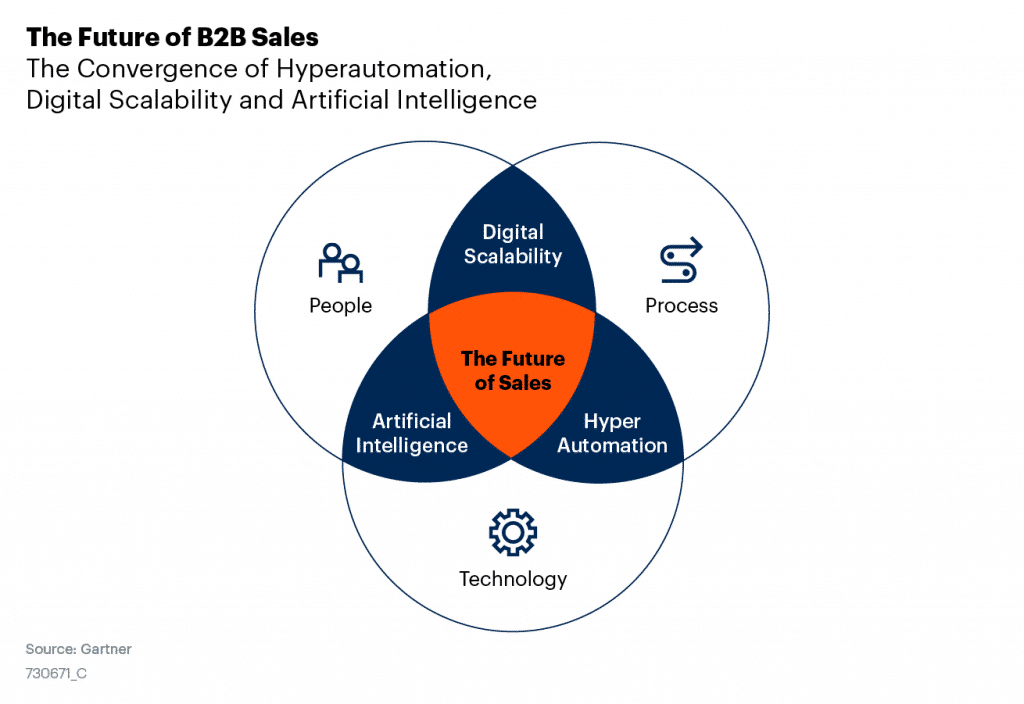Today, the need for sales automation and AI-enabled B2B customer experience at scale is higher than ever, and many sales leaders are still struggling to scale up their digital capabilities. In this blog, we tried to make your journey in the future of B2B sales easier.
Demands for enhanced sales automation and AI-enabled B2B customer experiences at scale are higher than ever. Many sales leaders are still struggling to scale up their digital capabilities, while Covid-19 imposed constraints on F2F meetings, travel, and physical events, which appear to be continuing for another year. Financial demands on the efficiency of B2B sales organisations will continue to rise.
Customer buying preferences started to change long before the pandemic, but the shutdown of all things physical have put companies with poor digital sales capabilities in dire straits. The good-to-have digital sales tools became a must-have, mission-critical business infrastructure overnight.
The Sales Model Needs an Overhaul
Customers value sales reps less than they have in the past while rewarding rich digital purchasing experiences. Today’s benchmarks are B2C platforms, not your B2B competitors. Nearly half of millennial buyers prefer no engagement with a salesperson at all, with the average being a third. In 2025, digital channels will account for four-fifths of all B2B sales engagements. Ultimately, the breakdown of the traditional sales model is driven by the digital shift in industrial buying, dramatically speeded up by the social distancing of vendors and clients.
While sales reps are managed with training, activity metrics and financial incentives, digital buying is managed with data and automation. The transformation from a human industrial relation is driven sales model to a process-driven digital engagement model is permanent. In many B2B organisations, the transformation journey has hardly begun.
Only a few organisations are excelling in the capture, organisation and utilisation of customer behavioural data. Increased digital buying means more data, and winning B2B organisations will rely significantly on essential real-time insights on where their consumers are, what they’re looking for, and when they’re willing to engage.
The Things You need to Master: Automation, Digital First and AI
Near future, sales strategies will be different, and the resources that are used will increasingly be based on new technologies, utilising new sources and forms of data. Meanwhile, the transformation has shifted the focus from the seller to the buyer.
These are the three key capabilities for building the B2B sales organisation of the near future:

Source: The Future of Sales in 2025 – A Gartner Trend Insight Report
- Hyperautomation – As digital engagements occur in multiple channels by prospects and buyers during all stages of the buying cycle, no human organisation will be able to respond adequately. The work is done by a wide array of automated sales tech tools that automate and augment the digital sales processes.
- Digital first – The role of sales reps has to be adjusted to correspond to the digital-first reality. To master both digital tools and data, they’ll need new skills. F2F will transform from being the default sales channel to being a selectively used tool for highly qualified customer encounters. Sales operatives will increasingly be involved in developing digital sales processes and assets. They will become digital co-sellers using websites, portals, e-commerce platforms and virtual assistants. Data and tech-savvy digital-first sellers can manage a customer reach previously possible only for marketers with access to media and research.
- Data, analytics, and Artificial intelligence – Data and sales tech tools enable automated, algorithmic decisions. Managing sales processes in different channels will heavily depend on the deployment of AI-based tools. Traditional, headcount based B2B sales development top-line contributions were highly linear – incremental headcount investments produced incremental sales growth. Gains from automated decisions and engagements are exponential and are only limited by the quality of their data and algorithms, not by new resources. Within 5-10 years, data and automation capabilities will separate the winners from the losers.
Implementing B2B e-commerce platforms and guided selling with the support of a growing array of smart sales tech tools isn’t the only way to go in the future. Fundamentally it is about redefining the entire omnichannel sales process. Most B2B leaders still seem to prefer a step-by-step approach, focusing on one building block at the time – such as your e-commerce platform. CRM implementation across multiple businesses and geographies is still a challenge for many. However, we believe that you cannot wait; you must make progress in all areas.
Take Your Sales Process to Sales 4.0.
Hear more on how to address these topics on our webinar “B2B Sales Trends 2021”: